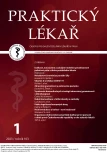-
Medical journals
- Career
Communication pitfalls in the treatment of obesity and overweight
Authors: J. Ludvíková 1; S. Krejčová 3; J. Urbanová 2; J. Malinovská 1; D. Pichlerová 1; V. Vejtasová 4; J. Brož 1
Authors‘ workplace: Interní klinika 2. LF UK a FN Motol, Praha, Přednosta: prof. MUDr. Radan Keil, Ph. D. 1; Oddělení klinické psychologie FN Motol, Praha, Primář: Mgr. Markéta Mohaplová 2; Interní klinika 3. LF UK a FNKV, Praha, Přednosta: prof. MUDr. Ivan Rychlík, CSc., FASN, FERA 3; Kardiologická klinika 2. LF UK a FN Motol, Praha, Přednosta: prof. MUDr. Josef Veselka, CSc. 4
Published in: Prakt. Lék. 2023; 103(1): 27-31
Category: Of different specialties
Overview
The societal stigma of obesity, consisting of negative attitudes towards people with higher than normal weight, is reflected in the interpersonal sphere and other aspects of life. For example, people with obesity have lower salaries and are disadvantaged in job interviews. Prejudice and negative attitudes towards overweight and obese people are also found among health professionals, delaying the initiation of early treatment and can have other negative effects on both the mental and physical health of patients, and lead to avoidance of visiting the doctor, which undermines trust and the patient-doctor relationship. Obesity treatment is usually initiated with a conversation, which can be a useful initial intervention even in its simplest form. However, both health professionals and patients often report apprehension about initiating such a conversation. The most common barriers cited by clinicians for avoiding the initial conversation are fear of making the patient feel offended, lack of time, knowledge and experience, lack of consensus on appropriate word choice, and beliefs about the small effect of their intervention.
Keywords:
obesity – communication – overweight – Motivation – stigmatization – barriers in communication
Sources
1. Petřeková K, Borzenko N, Strakoš J, a kol. Stravovací preference studentů vysoké školy v souvislosti s jejich tělesnou kompozicí. Prakt. Lék. 2022; 102(5): 241–247.
2. Tchang BG, Saunders KH, Igel LI. Best practices in the management of overweight and obesity. Med Clin North Am 2021; 105(1): 149–174.
3. Charlotte A, Strain WD, Le Brocq S, et al. The importance of language in engagement between health-care professionals and people living with obesity: a joint consensus statement. Lancet Diabetes Endocrinol 2020; 8(5): 447–455.
4. Auckburally S, Davies E, Logue J. The use of effective language and communication in the management of obesity: the challenge for healthcare professionals. Curr Obes Rep 2021; 10(3): 274–281.
5. Puhl RM, Heuer CA. The stigma of obesity: a review and update. Obesity (Silver Spring) 2009; 17(5): 941–964.
6. Puhl RM, Lessard LM. Weight stigma in youth: prevalence, consequences, and considerations for clinical practice. Curr Obes Rep 2020; 9(4): 402–411.
7. Wu YK, Berry DC. Impact of weight stigma on physiological and psychological health outcomes for overweight and obese adults: a systematic review. J Adv Nurs 2018; 74(5): 1030–1042.
8. Drury CA, Louis M. Exploring the association between body weight, stigma of obesity, and health care avoidance. J Am Acad Nurse Pract 2002; 14(12): 554–561.
9. Derksen RE, Brink-Melis WJ, Westerman M, et al. A local consensus process making use of focus groups to enhance the implementation of a national integrated health care standard on obesity care. Fam Pract 2012; 29(Suppl 1): i177–i184.
10. Glenister K, Opie CA, Wright J. Preferred language regarding overweight and obesity in general practice: a survey of predominantly rural Australian adults. Aust J Prim Health 2018; 24(5): 391–397.
11. Puhl RM. What words should we use to talk about weight? A systematic review of quantitative and qualitative studies examining preferences for weight-related terminology. Obes Rev 2020; 21(6): 354–362.
12. Puhl RM, Himmelstein MS. Adolescent preferences for weight terminology used by health care providers. Pediatr Obes 2018; 13(9): 533–540.
13. Malterud K, Ulriksen K. Obesity in general practice: a focus group study on patient experiences. Scand J Prim Health Care 2010; 28(4): 205–210.
14. Heintze C, Sonntag U, Brinck A, et al. Qualitative study on patients’ and physicians’ visions for the future management of overweight or obesity. Fam Pract 2012; 29(1): 103–109.
15. Claridge R, Gray L, Stubbe M, et al. General practitioner opinion of weight management interventions in New Zealand. J Prim Health Care 2014; 6 : 212–220.
16. Gunther S, Guo F, Sinfield P, et al. Barriers and enablers to managing obesity in general practice: a practical approach for use in implementation activities. Qual Prim Care 2012; 20(2): 93–103.
17. Hansson LM, Rasmussen F, Ahlstrom GI. General practitioners’ and district nurses’ conceptions of the encounter with obese patients in primary health care. BMC Fam Pract 2011; 12 : 7.
18. Ashman F, Sturgiss E, Haesler E. Exploring self-efficacy in Australian general practitioners managing patient obesity: a qualitative survey study. Int J Family Med 2016; 2016 : 8212837.
19. Albury C, Strain WD, Brocq SL, et al. Language Matters working group. The importance of language in engagement between health-care professionals and people living with obesity: a joint consensus statement. Lancet Diabetes Endocrinol 2020; 8(5): 447–455.
Labels
General practitioner for children and adolescents General practitioner for adults
Article was published inGeneral Practitioner

2023 Issue 1-
All articles in this issue
- Non-neoplastic portal vein thrombosis
- Association of vitamin D status and COVID-19 infection
- Health literacy and patient autonomy
- Using health literacy communication strategies in clinical practice
- Communication pitfalls in the treatment of obesity and overweight
- The risks of legalizing cannabis drugs
- Pain and neuromodulation – new possibilities
- The organization of the voluntary Samaritan service (first aid) during the First Czechoslovak Republic and the role of state doctors
- General Practitioner
- Journal archive
- Current issue
- Online only
- About the journal
Most read in this issue- Non-neoplastic portal vein thrombosis
- Pain and neuromodulation – new possibilities
- Using health literacy communication strategies in clinical practice
- Health literacy and patient autonomy
Login#ADS_BOTTOM_SCRIPTS#Forgotten passwordEnter the email address that you registered with. We will send you instructions on how to set a new password.
- Career

